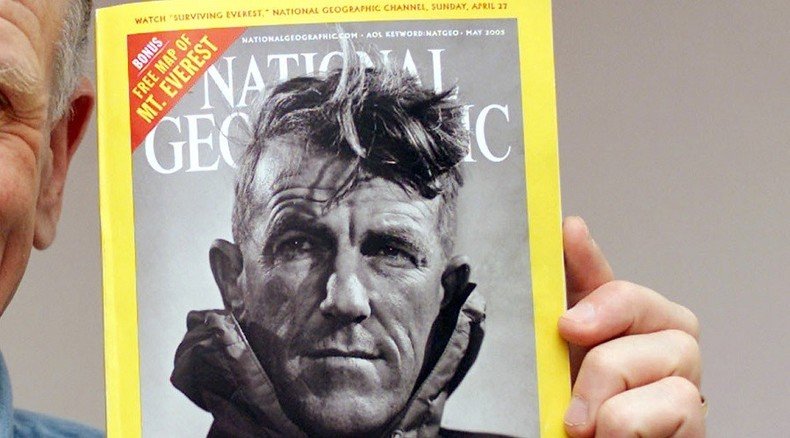National Geographic titles to be absorbed by Murdoch media empire

National Geographic’s media assets, run by a nonprofit founded in 1888, will become a profit-generating arm of 21st Century Fox. Critics worry that the partnership will harm scientific research and the magazine’s editorial integrity.
The two companies announced an expansion of an 18-year-old television partnership to include the National Geographic Society’s digital assets, media and publishing operations, travel programs, and licensing rights. The deal will create a new entity in which Fox will own 73 percent of the venture and the society will own the remaining 27 percent. The newly formed National Geographic Partners will have a shared governance structure and equal representation on the board of directors from both of its parent companies, the businesses said in a statement. It will also increase the organization’s endowment to more than $1 billion and will allow it to double its spending on research, science and other projects.
NEWS: National Geographic Society and 21st Century Fox Agree to Expand Partnership http://t.co/d7dFDYM6Ly
— Nat Geo PR (@NatGeoPR) September 9, 2015“What this really is about is creating a new company with the National Geographic brand at its heart,” James Murdoch, chief executive of 21st Century Fox, told the New York Times in a joint telephone interview with National Geographic Society President and CEO Gary Knell.
Knell will serve as the first chairman of the board, with the position alternating annually between the National Geographic Society and Fox.
In the statement, he described the deal as an “expansion” of the previous partnership and “another milestone for The National Geographic Society, which for much of its 127 years has sponsored groundbreaking scientists and explorers and shared the knowledge and wonder with the world, using the best and most creative media platforms of each era.”
Murdoch also commented on the expanded partnership, saying Fox was “privileged” to work with National Geographic.
Rupert Murdoch to step down as Fox CEO, will be replaced by son James -- reports http://t.co/k4CFAEoGUFpic.twitter.com/W2J33nWb8t
— RT America (@RT_America) June 12, 2015“We are privileged to have the opportunity to expand our partnership to continue to bring to audiences around the world, ‘The world and all that is in it,’ as National Geographic Society’s second president Alexander Graham Bell stated more than a century ago,” he said in the statement. “We believe in the Society’s mission of bringing the world to audiences through science, education and exploration.”
Their previous joint television venture, National Geographic Channels, includes domestic and international cable TV channels available in more than 500 million homes in 171 countries. Its operating profits surpassed $400 million last year, one executive told the Washington Post, although the society’s actual dividend has not been disclosed.
The new deal is expected to inject more money and fresh ideas into the flagging readership of the magazine and expand the society’s presence in the digital world. While the National Geographic Society is a nonprofit, the magazine’s main source of funding is advertising, which has been in decline since its domestic circulation peaked at about 12 million copies in the late 1980s, the Washington Post reported. The publication’s current circulation reaches about 3.5 million subscribers in the United States and an additional 3 million subscribers abroad through non-English-language editions.
Ever wondered what it’s like being eaten by vultures? This video shows it all! http://t.co/0a1yxtKlqopic.twitter.com/oi87FwMAMR
— RT America (@RT_America) September 9, 2015Knell noted that National Geographic Partners will generate a “consistent and attractive revenue stream,” ensuring that the company “will have greater resources for this work, which includes our grant making programs that support scientists and explorers around the world.”
“As media organizations work to meet the increasing demand for high quality storytelling across multiple platforms, it’s clear that the opportunity to grow by more closely aligning our branded content and licensing assets is the right path,” he continued. “We now will have the scale and reach to continue to fulfill our mission long into the future.”
Bad news for #nature lovers, as #climatedenier@rupertmurdoch buys National Geographic
http://t.co/AFYvn4GvBwpic.twitter.com/XRKLOSXgeP
— Greenpeace (@Greenpeace) September 10, 2015But critics, including Greenpeace, questioned whether the politics that Fox and sister company News Corp are known for, thanks to founder and father of the current CEO, Rupert Murdoch, would seep into the new partnership. The elder Murdoch is an avowed“climate change skeptic,” and the National Geographic Society gives grants to scientists, including those researching the effects of climate change.
A climate change skeptic not a denier. Sept UN meets in NY with endless alarmist nonsense from u know whom! Pessimists always seen as sages
— Rupert Murdoch (@rupertmurdoch) August 27, 2015Although the principle authors of the merger were quite upbeat about its potential, at the magazine’s downtown Washington offices, news of the deal apparently sent chills down the spine of many rank-and-file staff, with at least one journalist describing their reaction as “dread,” according to the Post.
Susan Goldberg, National Geographic’s editor in chief, pointed to previous problems with society’s TV collaboration with Fox.
“Fox has acknowledged that they have not always represented the National Geographic brand in some of those programs in a way we loved or even they loved,” she told the Post in an interview.
However, she still praised the opportunities to increased resources and distribution muscle for the digital and print operations
“It’s great news... It’s really a doubling down on our journalism and an investment in our journalism,” she said. “There’s always anxiety over any change... But holding still and doing the same thing is not a sustainable position.”
Look me in the eye and tell me you believe Fox National Geographic Magazine would have produced this issue. pic.twitter.com/UXeloVEsDr
— Peter Gleick (@PeterGleick) September 10, 2015IFL Science editor Elise Andrews wrote in a blog post that fears of politics influencing science are unfounded, pointing to Neil Degrasse Tyson’s show ‘Cosmos’, which Fox funded and aired, as well as the television partnership under which she said the society retained its editorial integrity.
“I would be deeply surprised if this deal were to result in a lessening of the scientific rigor that we have come to expect from National Geographic,” Andrews wrote. “NatGeo is staffed by thousands of the world’s best scientists and journalists, all of whom would be the first to run for the hills if they felt their editorial integrity was being threatened.“
The two companies will meet next week to discuss how assets will be organized and integrated into the newly formed National Geographic Partners. The transaction is expected to close by the end of the year.













